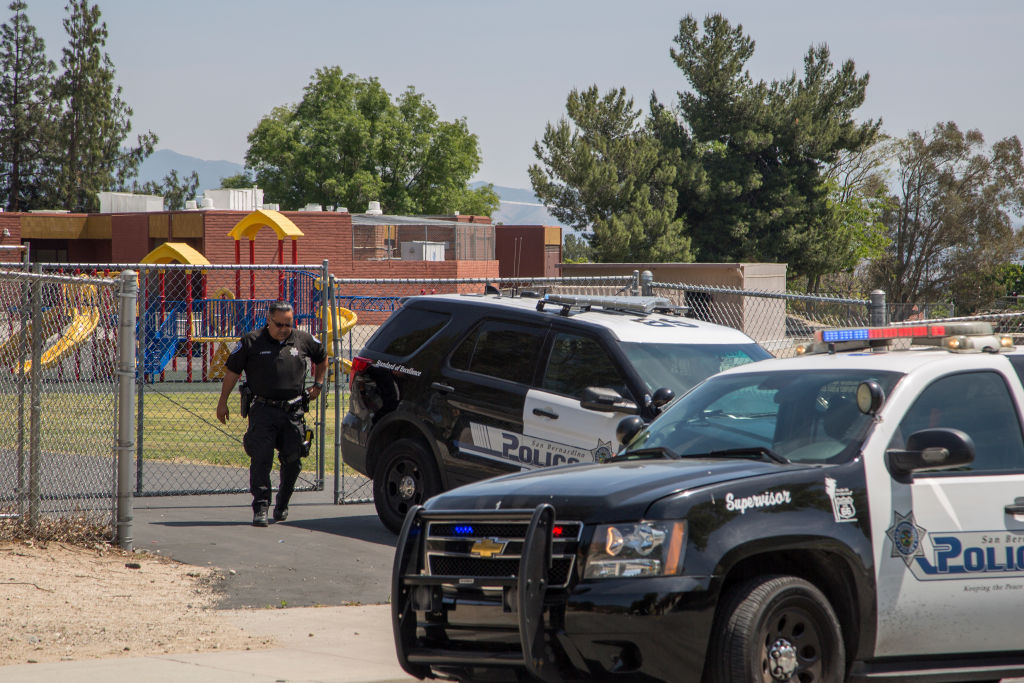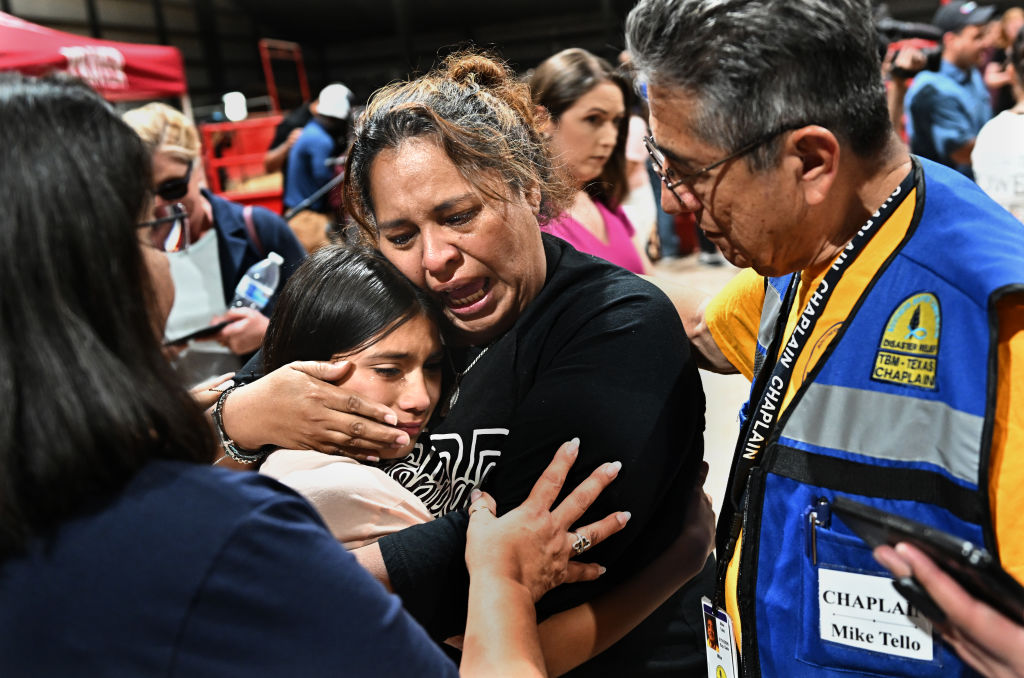Police In Schools: Why Students' Safety Doesn't Depend On Cops
As Classes Begin, A Reminder Why Police In Schools Aren’t The Answer To Students’ Safety

Source: David McNew / Getty
Another school year is underway, and parents are being asked to release fear and lean into hope for a safe year, despite the fact that school shootings have become a frightening new normal. We are all scared and want action. The short-lived outrage followed by a return to practices and policies that blatantly disregard common sense is not what we want or need. Many on Capitol Hill are discussing deploying more police to schools, even though this approach isn’t a workable solution. Responding to violence by unleashing state-sanctioned violence is not the response that we need.
The conversations that politicians have around school safety aren’t focused on keeping people safe; they center their own political ambitions and desire the appearance of action. We know that more police don’t keep our children safe. We can see the lack of safety in the countless videos of police brutalizing students. The fact that data has shown consistently that police do not stop crime but often escalate it doesn’t seem to resonate with them. They are grasping for quick fixes and easy solutions when what we truly need is comprehensive approaches to healthcare, climate crisis, employment, housing, and education. Our children need schools that have the resources and directives to create centers of care, critical thought and connection to the community. We need more schools that show us how to move into peaceful futures. We need schools that prioritize challenging the dangerous narratives of violence, individualism, patriarchy, and white supremacy.
MORE: School Safety Requires Deep Investment Not More Police
We can agree that children should be safe and free from harm. How we get there is where the debate arises. A solution that disregards the brutality that Black and brown bodies systematically experience at the hands of law enforcement is not a real solution. The unbearably long list of lives callously stolen from us at the hands of law enforcement should be evidence enough that police should not be entrusted with safety in any corners of our community– but especially not that of children. Data repeatedly shows us that police do not prevent crime but rather often escalate it. Common sense tells us that we do not solve violence with violence. A fundamental place to start is a deeper dive into the root causes of mass shootings: Why do people see violence as an option? Why are there not more resources available for people in crisis? Why have schools become a flashpoint for so much violence in this country? None of the answers to these fundamental questions ends with more police.
When we call for safety for children, we must have a nuanced view of what safety looks like in different communities. For people of color, more police mean more surveillance, more threat of incarceration and more abuse. For Black families, leaving our children in the care of armed police officers evokes more terror than assurance.
Here are four reasons why communities must embrace an alternative view of school safety.
- First, police do not keep children safe. Studies have shown that increased police presence does not prevent or stop school shootings. While concerned parents envision police in schools as keeping children safe from external threats, when police are in schools, they are often the threats themselves. They are often over-zealous, anxious to insert themselves in school disciplinary matters and biased towards Black, Brown, LGBTQIA+ students and students with disabilities. There have been over 200 documented cases of police attacking students. There is also a heightened risk of police sexualizing and sexually assaulting students while they are in school.
- Black children and youth are over-policed. Black students live in neighborhoods that are overwhelmed by police and abusive policing practices. They ride transit systems where the mere act of movement can be criminalized. They also attend schools where learning is routinely interrupted by policing and unfair policing practices.
- Policing is not a neutral or benign practice for our communities. With roots in slave patrols and a history of violently policing property, police violence has never abated. Additionally, the denial of Black humanity is engrained in the fabric of American policing; Black people are not seen as deserving of dignity and respect, but rather as enemies to be subjugated. Black children are routinely adultified, meaning that the innocence routinely granted to children is withheld from our children. Black children are criminalized at very young ages. Police rarely encounter Black children and think, “we should protect them.” Because of this, Black children and youth are constantly threatened by systems that institutionally target and blame their victims.
- Finally, through years of research, and on-the-ground organizing, we know what works in terms of keeping children safe at schools. Creating trusting relationships between adults and students, preventing violence before it happens, investing in restorative justice, ensuring there are counselors, not cops, and other positive safety measures are all effective at creating safety in schools. Investing in leadership development, political education, and youth organizing are also valuable tools in building nurturing school environments. We should be investing in these measures, not spending precious resources on persons who resent our existence.
These aren’t empty words. We have a history of working to create safety in schools and communities that does not involve the police. Additionally, when the Black Organizing Project began organizing to remove police from schools in Oakland, it was because we knew that our future, our children’s future, and our community’s future depended on it. Mother Jones reported that “Since the 2015–2016 school year, Black students have accounted for nearly three out of four arrests at Oakland schools, despite constituting 26 percent of students. From 2010 to 2012, not a single white student was arrested by Oakland School Police.”
We know that Black children aren’t inherently flawed; but rather live in a system that has a narrow and damaging view of Blackness, including Black youth. What is more, children and youth cannot learn when they are terrified.
It is time for elected officials to shift from this troubling idea of police as the answer to violence. It is time for collective action towards long-term solutions that consider the unique perspectives of young people, including young people of color. The truth is that police in schools will not keep young people safe and it is time for an expanded dialogue around policing.
Malaika Parker has worked toward the creation of a racially just SF Bay Area for 25 years. Malaika has demonstrated her commitment to BIPOC communities by working diligently to address issues of police accountability, racial justice in education, environmental justice and race-based inequities in the child welfare system. Malaika is the founder of Hummingbirds Urban Farming Collective, a project that works at the intersection of race and ecological justice, promoting food sovereignty and an ancestral connection between Black children and the communities that raise them. Malaika holds a master’s degree in Social Justice and Equity in Education from San Francisco State University. In 2020, Malaika was awarded a Women of Color LeadStrong Fellowship.
SEE ALSO:
OP-ED: Police-Free Schools Are Critical To Reproductive Freedom
School Resource Officer Arrested After Video Shows Teen Student Brutally Attacked
















